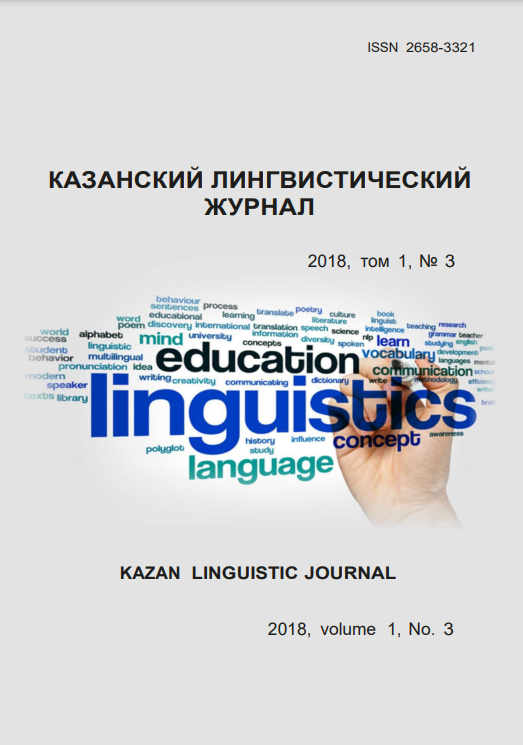Genre and generic differentiation of language creativity on the internet and runet
Keywords:
internet folklore, network literature, internet, Runet, verbal creativity, genres, communication, folklore featuresAbstract
The work is devoted to the problem of differentiation of the modern verbal art, existing on the internet and Runet. On the basis of the conducted research it is offered to allocate two forms of verbal creativity presented on the web – folklore and literature. The task is to analyze the distinctive features of these phenomena in order to point out their genre and generic dissimilarity.
The article explains the concepts of "internet folklore" and "network literature", and dwells on general characteristics of both occurrences. The study of the characteristic features of literary and folklore works placed on the internet revealed their kinship and common features conditioned by the virtual format, which prevent researchers from clearly distinguishing these phenomena from one another. Particular attention is drawn to the constitutive features of the internet folklore, which prove that this phenomenon of modern culture is unique and independent.
The question of genre-generic division of the verbal art remains open and requires further research.
References
Литература
Загидуллина М.В. Теория интернет-фольклора: коммуникация фольклорного типа и самоидентификация участников крупных форумов // Учен. зап. Казан. ун-та. Сер. Гуманит. науки. Т. 157, № 4. Казань, 2015. С. 86–96.
Ким Л.Р. Изучение русской сетевой литературы фольклористическими методами: к постановке проблемы // Филологические науки. Вопросы теории и практики. Ч. 2, № 2(80). Тамбов: Грамота, 2018. С. 232–236.
Петренко С.Н. Жанровые традиции постфольклора в поэтике современной русской литературы // Изв. ВГПУ. Актуальные проблемы литературоведения. Вып. № 2 (87). Волгоград, 2014. С. 145–149.
Проект Ю. Л. Сетевая литература // Universum: Вестник Герценовского университета. СПб, 2012. С. 208–209.
Пропп В.Я. Поэтика фольклора (Собрание трудов). М.: Издательство «Лабиринт», 1998. 352 с.
Радченко Д.А. Сетевой фольклор как способ осмысления актуальной реальности // Folk-art-net: новые горизонты творчества. От традиции – к виртуальности. Сборник статей. М.: ГРЦРФ, 2007. С. 63–75.
Савченко А.В., Суслова Т.И. Интернет-фольклор как возможность сетевой культурной самоидентификации // Connect Universum 2012. URL: http://connect-universum.tsu.ru/blog/connectuniversum2012_ru/22.html (дата обращения: 10.12.18).
Суслова Т.И. Интернет-фольклор как средство коммуникации // Журналистский ежегодник. № 4. Томск, 2015. C. 123–127.
Westerman W. Epistemology, the Sociology of Knowledge, and the Wikipedia Userbox Controversy // Folklore and the Internet: Vernacular Expression in a Digital World. Edited by Trevor J. Blank. University Press of Colorado, Utah State University Press. 2009. pp. 123–158.
References
Zagidullina, M.V. (2015). Teoriia internet-fol'klora: kommunikatsiia fol'klornogo tipa i samoidentifikatsiia uchastnikov krupnykh forumov [Theory of internet folklore: communication of folklore type and self-identification of the participants of large forums] // Uchen. zap. Kazan. un-ta. Ser. Gumanit. nauki. T. 157, № 4. Kazan, pp. 86–96. (In Russian).
Kim, L.R. (2018). Izuchenie russkoi setevoi literatury fol'kloristicheskimi metodami: k postanovke problemy [The study of Russian network literature by folkloristic methods: to the problem statement] // Filologicheskie nauki. Voprosy teorii i praktiki. Ch. 2, № 2(80). Tambov: Gramota, pp. 232–236. (In Russian).
Petrenko, S.N. (2014). Zhanrovye traditsii postfol'klora v poetike sovremennoi russkoi literatury [Genre traditions of post-folklore in poetics of modern Russian literature] // Izv. VGPU. Aktual'nye problemy literaturovedeniia. Vyp. № 2 (87). Volgograd, pp. 145–149. (In Russian).
Proekt, Iu. L. (2012) Setevaia literatura [Network literature] // Universum: Vestnik Gertsenovskogo universiteta. St. Petersburg, pp. 208–209. (In Russian).
Propp, V.Ia. (1998). Poetika fol'klora (Sobranie trudov) [The poetics of folklore (a collection of writings)]. Moscow, Izdatel'stvo «Labirint», 352 p. (In Russian).
Radchenko, D.A. (2007). Setevoi fol'klor kak sposob osmysleniia aktual'noi real'nosti [Network folklore as a way of understanding the actual reality] // Folk-art-net: novye gorizonty tvorchestva. Ot traditsii – k virtual'nosti. Sbornik statei. Moscow, GRTsRF, pp. 63–75. (In Russian).
Savchenko, A.V., Suslova, T.I. (2012). Internet-fol'klor kak vozmozhnost' setevoi kul'turnoi samoidentifikatsii [Internet folklore as an opportunity of network cultural self-identification] // Connect Universum. URL: http://connect- universum.tsu.ru/blog/connectuniversum2012_ru/22.html (accessed: 10.12.18). (In Russian).
Suslova, T.I. (2015). Internet-fol'klor kak sredstvo kommunikatsii [Internet folklore as a means of communication] // Zhurnalistskii ezhegodnik, № 4. Tomsk, pp. 123–127. (In Russian).
Westerman, W. (2009). Epistemology, the Sociology of Knowledge, and the Wikipedia Userbox Controversy // Folklore and the Internet: Vernacular Expression in a Digital World. Edited by Trevor J. Blank. University Press of Colorado, Utah State University Press, pp. 123–158. (In English).






